- Home
- E. M. Forster
Howards End Page 11
Howards End Read online
Page 11
He himself, gazing at the wintry garden, was in appearance a steady man. His face was not as square as his son‘s, and, indeed, the chin, though firm enough in outline, retreated a little, and the lips, ambiguous, were curtained by a moustache. But there was no external hint of weakness. The eyes, if capable of kindness and good-fellowship, if ruddy for the moment with tears, were the eyes of one who could not be driven. The forehead, too, was like Charles’s. High and straight, brown and polished, merging abruptly into temples and skull, it had the effect of a bastion that protected his head from the world. At times it had the effect of a blank wall. He had dwelt behind it, intact and happy, for fifty years.
“The post’s come, Father,” said Evie awkwardly.
“Thanks. Put it down.”
“Has the breakfast been all right?”
“Yes, thanks.”
The girl glanced at him and at it with constraint. She did not know what to do.
“Charles says do you want the Times?”
“No, I’ll read it later.”
“Ring if you want anything, Father, won’t you?”
“I’ve all I want.”
Having sorted the letters from the circulars, she went back to the dining-room.
“Father’s eaten nothing,” she announced, sitting down with wrinkled brows behind the tea-urn.
Charles did not answer, but after a moment he ran quickly upstairs, opened the door, and said: “Look here, Father, you must eat, you know”; and having paused for a reply that did not come, stole down again. “He’s going to read his letters first, I think,” he said evasively; “I dare say he will go on with his breakfast afterwards.” Then he took up the Times, and for some time there was no sound except the clink of cup against saucer and of knife on plate.
Poor Mrs. Charles sat between her silent companions, terrified at the course of events, and a little bored. She was a rubbishy little creature, and she knew it. A telegram had dragged her from Naples to the deathbed of a woman whom she had scarcely known. A word from her husband had plunged her into mourning. She desired to mourn inwardly as well, but she wished that Mrs. Wilcox, since fated to die, could have died before the marriage, for then less would have been expected of her. Crumbling her toast, and too nervous to ask for the butter, she remained almost motionless, thankful only for this, that her father-in-law was having his breakfast upstairs.
At last Charles spoke. “They had no business to be pollarding those elms yesterday,” he said to his sister.
“No indeed.” “I must make a note of that,” he continued. “I am surprised that the rector allowed it.”
“Perhaps it may not be the rector’s affair.”
“Whose else could it be?”
“The lord of the manor.”
“Impossible. ”
“Butter, Dolly?”
“Thank you, Evie dear. Charles—”
“Yes, dear?”
“I didn’t know one could pollard elms. I thought one only pollarded willows.”
“Oh no, one can pollard elms.”
“Then why oughtn’t the elms in the churchyard to be pollarded?”
Charles frowned a little, and turned again to his sister. “Another point. I must speak to Chalkeley.”
“Yes, rather; you must complain to Chalkeley.”
“It’s no good him saying he is not responsible for those men. He is responsible.”
“Yes, rather.”
Brother and sister were not callous. They spoke thus, partly because they desired to keep Chalkeley up to the mark—a healthy desire in its way—partly because they avoided the personal note in life. All Wilcoxes did. It did not seem to them of supreme importance. Or it may be as Helen supposed: they realized its importance, but were afraid of it. Panic and emptiness, could one glance behind. They were not callous, and they left the breakfast-table with aching hearts. Their mother never had come in to breakfast. It was in the other rooms, and especially in the garden, that they felt her loss most. As Charles went out to the garage, he was reminded at every step of the woman who had loved him and whom he could never replace. What battles he had fought against her gentle conservatism! How she had disliked improvements, yet how loyally she had accepted them when made! He and his father—what trouble they had had to get this very garage! With what difficulty had they persuaded her to yield them the paddock for it—the paddock that she loved more dearly than the garden itself! The vine—she had got her way about the vine. It still encumbered the south wall with its unproductive branches. And so with Evie, as she stood talking to the cook. Though she could take up her mother’s work inside the house, just as the man could take it up without, she felt that something unique had fallen out of her life. Their grief, though less poignant than their father‘s, grew from deeper roots, for a wife may be replaced; a mother never.
Charles would go back to the office. There was little to do at Howards End. The contents of his mother’s will had been long known to them. There were no legacies, no annuities, none of the posthumous bustle with which some of the dead prolong their activities. Trusting her husband, she had left him everything without reserve. She was quite a poor woman—the house had been all her dowry, and the house would come to Charles in time. Her water-colours Mr. Wilcox intended to reserve for Paul, while Evie would take the jewellery and lace. How easily she slipped out of life! Charles thought the habit laudable, though he did not intend to adopt it himself, whereas Margaret would have seen in it an almost culpable indifference to earthly fame. Cynicism—not the superficial cynicism that snarls and sneers, but the cynicism that can go with courtesy and tenderness—that was the note of Mrs. Wilcox’s will. She wanted not to vex people. That accomplished, the earth might freeze over her for ever.
No, there was nothing for Charles to wait for. He could not go on with his honeymoon, so he would go up to London and work—he felt too miserable hanging about. He and Dolly would have the furnished flat while his father rested quietly in the country with Evie. He could also keep an eye on his own little house, which was being painted and decorated for him in one of the Surrey suburbs, and in which he hoped to install himself soon after Christmas. Yes, he would go up after lunch in his new motor, and the town servants, who had come down for the funeral, would go up by train.
He found his father’s chauffeur in the garage, said “Morning” without looking at the man’s face, and, bending over the car, continued: “Hullo! my new car’s been driven!”
“Has it, sir?”
“Yes,” said Charles, getting rather red; “and whoever’s driven it hasn’t cleaned it properly, for there’s mud on the axle. Take it off.”
The man went for the cloths without a word. He was a chauffeur as ugly as sin—not that this did him disservice with Charles, who thought charm in a man rather rot, and had soon got rid of the little Italian beast with whom they had started.
“Charles—” His bride was tripping after him over the hoarfrost, a dainty black column, her little face and elaborate mourning hat forming the capital thereof.
“One minute, I’m busy. Well, Crane, who’s been driving it, do you suppose?”
“Don’t know, I’m sure, sir. No one’s driven it since I’ve been back, but, of course, there’s the fortnight I’ve been away with the other car in Yorkshire.”
The mud came off easily.
“Charles, your father’s down. Something’s happened. He wants you in the house at once. Oh, Charles!”
“Wait, dear, wait a minute. Who had the key to the garage while you were away, Crane?”
“The gardener, sir.”
“Do you mean to tell me that old Penny can drive a motor?”
“No, sir; no one’s had the motor out, sir.”
“Then how do you account for the mud on the axle?”
“I can‘t, of course, say for the time I’ve been in Yorkshire. No more mud now, sir.”
Charles was vexed. The man was treating him as a fool, and if his heart had not been so heavy he would have
reported him to his father. But it was not a morning for complaints. Ordering the motor to be round after lunch, he joined his wife, who had all the while been pouring out some incoherent story about a letter and a Miss Schlegel.
“Now, Dolly, I can attend to you. Miss Schlegel? What does she want?”
When people wrote a letter, Charles always asked what they wanted. Want was to him the only cause of action. And the question in this case was correct, for his wife replied: “She wants Howards End.”
“Howards End? Now, Crane, just don’t forget to put on the Stepney wheel.”
“No, sir.”
“Now, mind you don’t forget, for I—Come, little woman.” When they were out of the chauffeur’s sight he put his arm round her waist and pressed her against him. All his affection and half his attention—it was what he granted her throughout their happy married life.
“But you haven’t listened, Charles—”
“What’s wrong?”
“I keep on telling you—Howards End. Miss Schlegel’s got it. ”
“Got what?” said Charles, unclasping her. “What the dickens are you talking about?”
“Now, Charles, you promised not to say those naughty—”
“Look here, I’m in no mood for foolery. It’s no morning for it either. ”
“I tell you—I keep on telling you—Miss Schlegel—she’s got it—your mother’s left it to her—and you’ve all got to move out!”
“Howards End?”
“Howards End!” she screamed, mimicking him, and as she did so Evie came dashing out of the shrubbery.
“Dolly, go back at once! My father’s much annoyed with you. Charles”—she hit herself wildly—“come in at once to Father. He’s had a letter that’s too awful.”
Charles began to run, but checked himself, and stepped heavily across the gravel path. There the house was—the nine windows, the unprolific vine. He exclaimed: “Schlegels again!” and as if to complete chaos, Dolly said: “Oh no, the matron of the nursing-home has written instead of her.”
“Come in, all three of you!” cried his father, no longer inert. “Dolly, why have you disobeyed me?”
“Oh, Mr. Wilcox—”
“I told you not to go out to the garage. I’ve heard you all shouting in the garden. I won’t have it. Come in.”
He stood in the porch, transformed, letters in his hand.
“Into the dining-room, every one of you. We can’t discuss private matters in the middle of all the servants. Here, Charles, here; read these. See what you make.”
Charles took two letters, and read them as he followed the procession. The first was a covering note from the matron. Mrs. Wilcox had desired her, when the funeral should be over, to forward the enclosed. The enclosed—it was from his mother herself. She had written: “To my husband: I should like Miss Schlegel (Margaret) to have Howards End.”
“I suppose we’re going to have a talk about this?” he remarked, ominously calm.
“Certainly. I was coming out to you when Dolly—”
“Well, let’s sit down.”
“Come, Evie, don’t waste time, sit down.”
In silence they drew up to the breakfast-table. The events of yesterday—indeed, of this morning—suddenly receded into a past so remote that they seemed scarcely to have lived in it. Heavy breathings were heard. They were calming themselves. Charles, to steady them further, read the enclosure out loud: “A note in my mother’s handwriting, in an envelope addressed to my father, sealed. Inside: ‘I should like Miss Schlegel (Margaret) to have Howards End.’ No date, no signature. Forwarded through the matron of that nursing-home. Now, the question is—”
Dolly interrupted him. “But I say that note isn’t legal. Houses ought to be done by a lawyer, Charles, surely.”
Her husband worked his jaw severely. Little lumps appeared in front of either ear—a symptom that she had not yet learnt to respect, and she asked whether she might see the note. Charles looked at his father for permission, who said abstractedly: “Give it her.” She seized it, and at once exclaimed: “Why, it’s only in pencil! I said so. Pencil never counts.”
“We know that it is not legally binding, Dolly,” said Mr. Wilcox, speaking from out of his fortress. “We are aware of that. Legally, I should be justified in tearing it up and throwing it into the fire. Of course, my dear, we consider you as one of the family, but it will be better if you do not interfere with what you do not understand.”
Charles, vexed both with his father and his wife, then repeated: “The question is—” He had cleared a space of the breakfast-table from plates and knives so that he could draw patterns on the tablecloth. “The question is whether Miss Schlegel, during the fortnight we were all away, whether she unduly—” He stopped.
“I don’t think that,” said his father, whose nature was nobler than his son’s.
“Don’t think what?”
“That she would have—that it is a case of undue influence. No, to my mind the question is the—the invalid’s condition at the time she wrote.”
“My dear father, consult an expert if you like, but I don’t admit it is my mother’s writing.”
“Why, you just said it was!” cried Dolly.
“Never mind if I did,” he blazed out; “and hold your tongue.”
The poor little wife coloured at this, and, drawing her handkerchief from her pocket, shed a few tears. No one noticed her. Evie was scowling like an angry boy. The two men were gradually assuming the manner of the committee-room. They were both at their best when serving on committees. They did not make the mistake of handling human affairs in the bulk, but disposed of them item by item, sharply. Calligraphy was the item before them now, and on it they turned their well-trained brains. Charles, after a little demur, accepted the writing as genuine, and they passed on to the next point. It is the best—perhaps the only—way of dodging emotion. They were the average human article, and had they considered the note as a whole, it would have driven them miserable or mad. Considered item by item, the emotional content was minimized, and all went forward smoothly. The clock ticked, the coals blazed higher, and contended with the white radiance that poured in through the windows. Unnoticed, the sun occupied his sky, and the shadows of the tree stems, extraordinarily solid, fell like trenches of purple across the frosted lawn. It was a glorious winter morning. Evie’s fox terrier, who had passed for white, was only a dirty grey dog now, so intense was the purity that surrounded him. He was discredited, but the blackbirds that he was chasing glowed with Arabian darkness, for all the conventional colouring of life had been altered. Inside, the clock struck ten with a rich and confident note. Other clocks confirmed it, and the discussion moved towards its close.
To follow it is unnecessary. It is rather a moment when the commentator should step forward. Ought the Wilcoxes to have offered their home to Margaret? I think not. The appeal was too flimsy. It was not legal; it had been written in illness, and under the spell of a sudden friendship; it was contrary to the dead woman’s intentions in the past, contrary to her very nature, so far as that nature was understood by them. To them Howards End was a house: they could not know that to her it had been a spirit, for which she sought a spiritual heir. And—pushing one step farther in these mists—may they not have decided even better than they supposed? Is it credible that the possessions of the spirit can be bequeathed at all? Has the soul offspring? A wych-elm tree, a vine, a wisp of hay with dew on it—can passion for such things be transmitted where there is no bond of blood? No; the Wilcoxes are not to be blamed. The problem is too terrific, and they could not even perceive a problem. No; it is natural and fitting that after due debate they should tear the note up and throw it on to their dining-room fire. The practical moralist may acquit them absolutely. He who strives to look deeper may acquit them—atmost. For one hard fact remains. They did neglect a personal appeal. The woman who had died did say to them: “Do this,” and they answered: “We will not.”
The incident made a
most painful impression on them. Grief mounted into the brain and worked there disquietingly. Yesterday they had lamented: “She was a dear mother, a true wife: in our absence she neglected her health and died.” Today they thought: “She was not as true, as dear, as we supposed.” The desire for a more inward light had found expression at last, the unseen had impacted on the seen, and all that they could say was “Treachery.” Mrs. Wilcox had been treacherous to the family, to the laws of property, to her own written word. How did she expect Howards End to be conveyed to Miss Schlegel? Was her husband, to whom it legally belonged, to make it over to her as a free gift? Was the said Miss Schlegel to have a life interest in it, or to own it absolutely? Was there to be no compensation for the garage and other improvements that they had made under the assumption that all would be theirs some day? Treacherous! Treacherous and absurd! When we think the dead both treacherous and absurd, we have gone far towards reconciling ourselves to their departure. That note, scribbled in pencil, sent through the matron, was unbusinesslike as well as cruel, and decreased at once the value of the woman who had written it.
“Ah, well!” said Mr. Wilcox, rising from the table. “I shouldn’t have thought it possible.”
“Mother couldn’t have meant it,” said Evie, still frowning.
“No, my girl, of course not.”
“Mother believed so in ancestors too—it isn’t like her to leave anything to an outsider, who’d never appreciate.”
“The whole thing is unlike her,” he announced. “If Miss Schlegel had been poor, if she had wanted a house, I could understand it a little. But she has a house of her own. Why should she want another? She wouldn’t have any use for Howards End.”
“That time may prove,” murmured Charles.
“How?” asked his sister.
“Presumably she knows—Mother will have told her. She got twice or three times into the nursing-home. Presumably she is awaiting developments.”
“What a horrid woman!” And Dolly, who had recovered, cried: “Why, she may be coming down to turn us out now!”

 The Celestial Omnibus and Other Stories
The Celestial Omnibus and Other Stories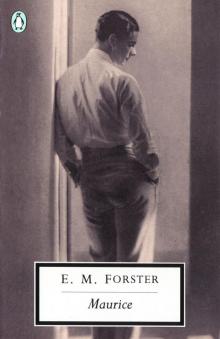 Maurice
Maurice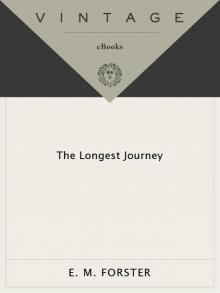 The Longest Journey
The Longest Journey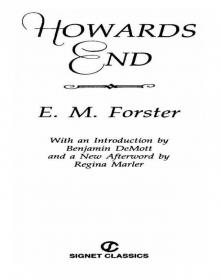 Howards End
Howards End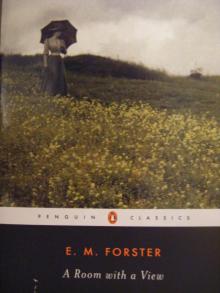 A Room with a View
A Room with a View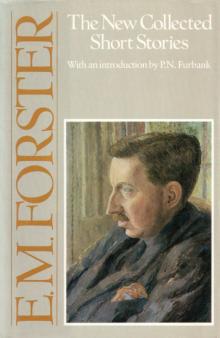 The New Collected Short Stories
The New Collected Short Stories A Passage to India
A Passage to India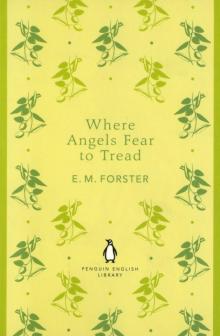 Where Angels Fear to Tread
Where Angels Fear to Tread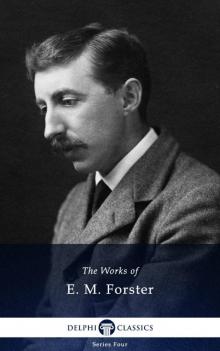 Works of E M Forster
Works of E M Forster Selected Stories
Selected Stories The Machine Stops
The Machine Stops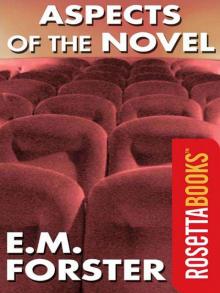 Aspects of the Novel
Aspects of the Novel